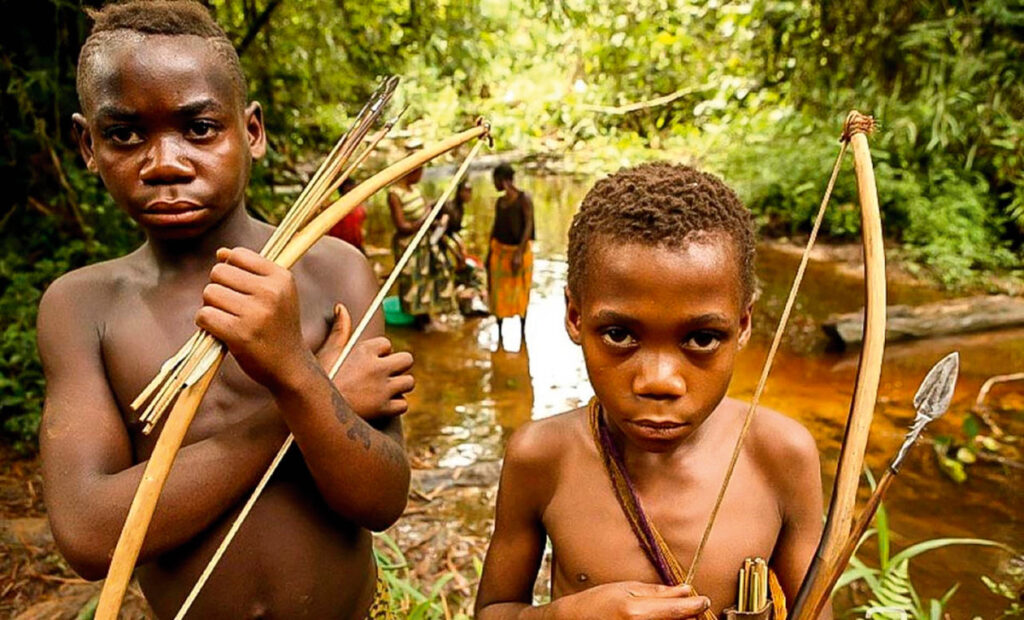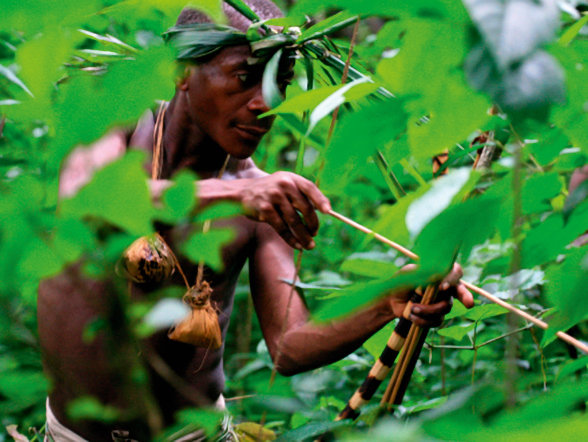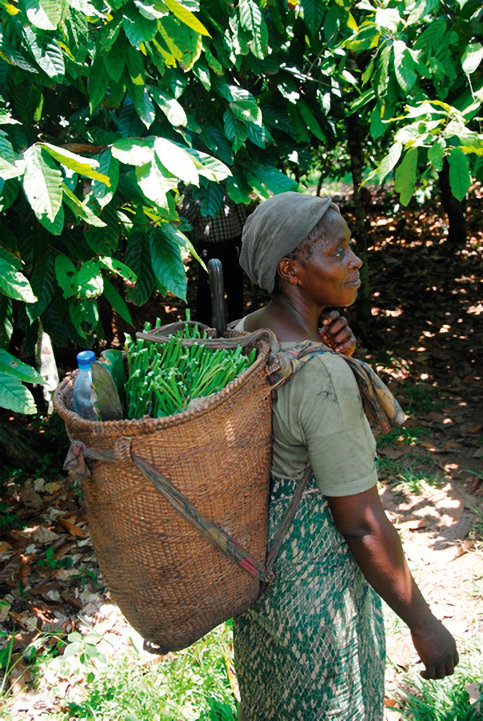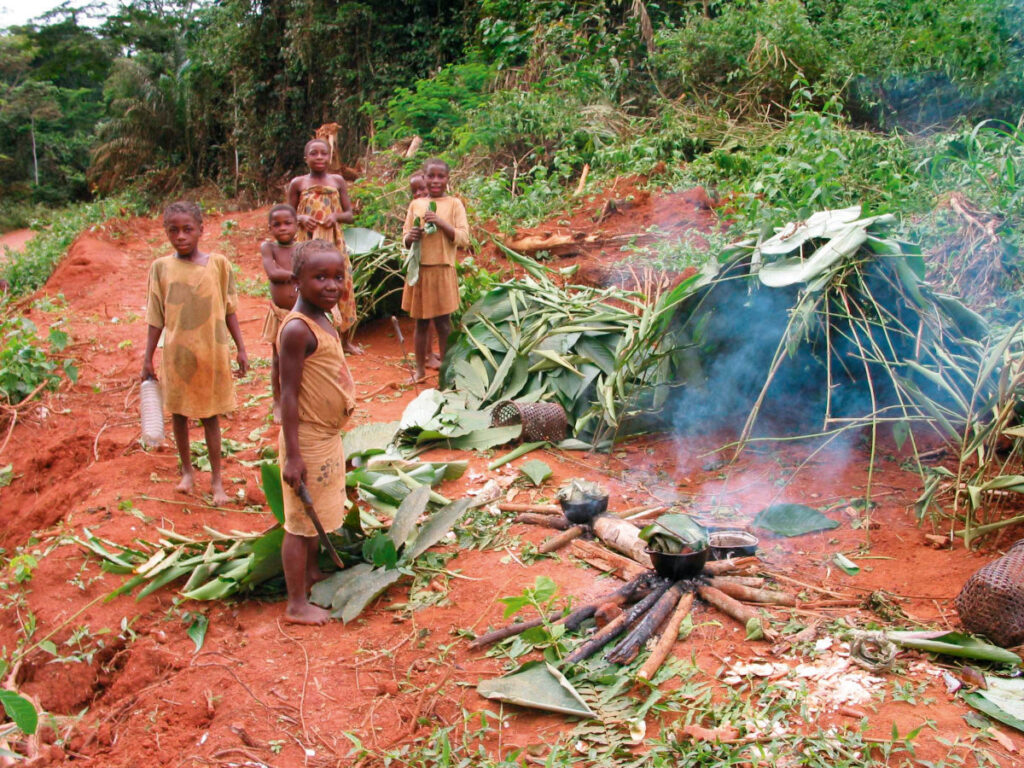[LUM#21] Kings without forests
Part of the Baka group lives in the dense forest in southern Cameroon. Since the 1950s, forced sedentarization and restrictions on forest access rights have gradually cut these populations off from their livelihoods and the practices that constitute their identity, foremost among which is hunting.

They are the misnamed. Known by the pejorative name of Pygmies, meaning "one cubit tall" in ancient Greek, this people lived until the 1950s in nomadic camps in the heart of the equatorial forests between Cameroon, Gabon, the Central African Republic, and Congo. In old engravings dating back to the colonial era, they are often depicted with spears in their hands, facing an elephant almost as huge as they are frail. "Elephant hunting was an initiation rite for the Bakas, a test that allowed young people to become Tūmā, or master hunters," explains Laurence Boutinot, an anthropologist at the Forests and Societies Laboratory.1.
In Cameroon, the Bakas' lives are structured around this hunting practice, as the researcher points out: "Hunting is a collective activity; it is part of a way of life, socialization, and knowledge transmission." It is also a key part of the Bakas' identity, unlike their Bantu neighbors, with whom they have always had close and complex ties. "They are somewhat the kings of the forest and the night, while the sedentary Bantu are more familiar with the daytime practices of agriculture."
Silent resistance
Today, these nomadic camps are more discreet, fewer in number, and set up in the forest for shorter periods of time. The rest of the year, the Bakas camp along trails near villages. "Victims of exclusion and racism, deprived of hunting and the forest, with limited access to school and the job market, the Bakas find themselves in situations of idleness. Some spend what little money they have on small bags of alcohol that motorcycle traders supply them with at a good price," laments the anthropologist. To understand this unfortunate development, as is often the case in Africa, we must go back to the colonial era.
The arrival of colonizers, missionaries, and administrators on African soil required significant food supplies, so Westerners gradually granted themselves exclusive hunting rights in forest areas. "Wildlife was also hunted for trophies, which were highly prized on international markets at the time, and Westerners established rules that excluded indigenous peoples. From being subsistence hunters, the latter found themselves accused of poaching.2 " (Surveiller sans punir. Un commun de résistance à travers le "braconnage" dans les forêts camerounaises). This marked the beginning of the silent resistance of the Baka people who, without expressing any overt opposition, never stopped going into the forest to hunt, thus exposing themselves to repression (Journey of silent resistance in the forests of Cameroon).
Enclosure
At the same time, the colonial administration divided up the territory and only recognized the already sedentary Bantu village chiefs as having rights to the land. The mobility of the Bakas meant that they were largely overlooked in this distribution. When, in the 1950s, the same administration forced all indigenous people to settle down so that it could collect taxes and requisition labor, "they found themselves landless, forced to settle along the roadsides. But even then, the clans continued to meet in the forest during the right season to hunt under the radar of the authorities," the researcher continues.
With decolonization, the Bakas did not regain free use of the forest. On the contrary, the creation of protected areas for wildlife, national parks for tourism, and the influence of forest management units for timber exploitation, historically owned by French companies, increasingly restrict access to hunting grounds (The rights of local and indigenous peoples in light of forestry and conservation policies). "Today, the forest is divided up and monopolized on all sides. Forests are being enclosed in order to exclude farmers and hunters from using these public goods. Community forests, which the law allows villages to manage, are already degraded areas, emptied of their wildlife and even their precious species. The caterpillars that are prized on the markets are no longer found there because the trees have been cut down."
Three villains3 rabbits
As for hunting, increasingly sophisticated rules have not worked in favor of the Bakas. While they are still allowed to use traditional spears, the game that can be hunted with this weapon is no longer permitted. "This weapon is designed to kill large game, not rabbits or nutria, but large game is now protected by the IUCN, which does not prevent large-scale poachers from doing their business. Firearms are permitted , but only if you have a gun license, which requires identification papers, "and therefore money! It's a whole process that excludes them," notes Laurence Boutinot.
With no land to farm and no access to the forest, the Bakas sometimes work in the fields for the Bantus in exchange for a few CFA francs, when they are not being exploited for free. "The most cynical thing is that logging companies now employ them to monitor the forests from which they are being driven out and to report poachers who are sometimes their own brothers." The anthropologist recounts his arrival in the village of Mindourou during his last mission to Cameroon in 2018: "Next to the gendarmerie hut was a fenced-in area where a Baka man had been locked up for several months. He had been caught with three evil rabbits in his bag."



Find UM podcasts now available on your favorite platform (Spotify, Deezer, Apple Podcasts, Amazon Music, etc.).
- The Bantu group includes various ethnic groups, such as the Badjoué and Bayélé, who speak Bantu languages shared by many societies in Central Africa, including the Aka groups of the Central African Republic. The Bakas of Cameroon speak an Obangian language. See Bahuchet, S., 1989, Les Pygmées Aka et Baka. Contribution de l’ethnolinguistique à l’histoire des populations forestières d’Afrique Centrale. Doctoral thesis, René Descartes University, Paris V. ↩︎
- See P-A Roulet, 2004, Chasseur blanc, cœur noir ? La chasse sportive en Afrique Centrale(White Hunter, Black Heart? Sport Hunting in Central Africa), doctoral thesis, geography, University of Orleans, 563 p. ↩︎
- From Gaston Couté's song "Chanson de braconnier" in La chanson d'un gâs qu'a mal tourné, Complete Works, Volume 1, Saint-Denis, Le Vent du Ch'min, 1976, 131 p. p. 61, quoted by Mayaux J-L, 2006, p. 25. ↩︎